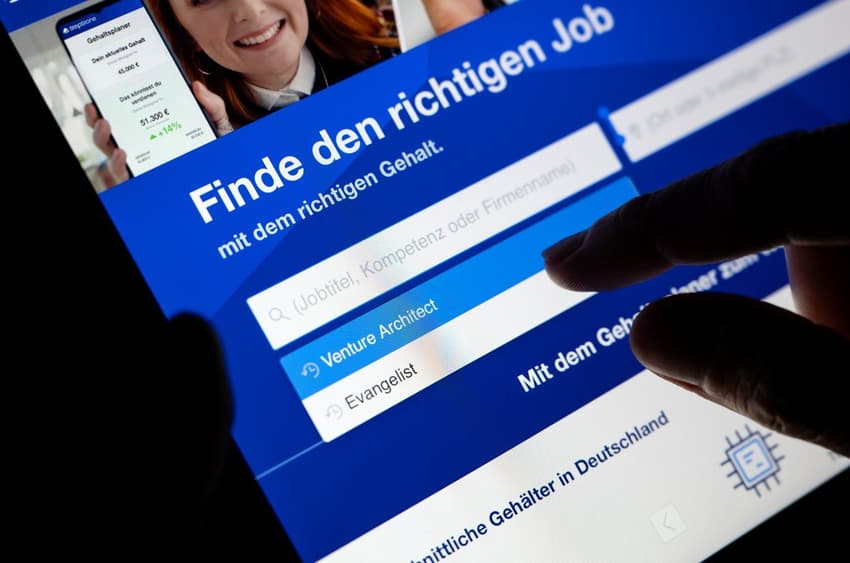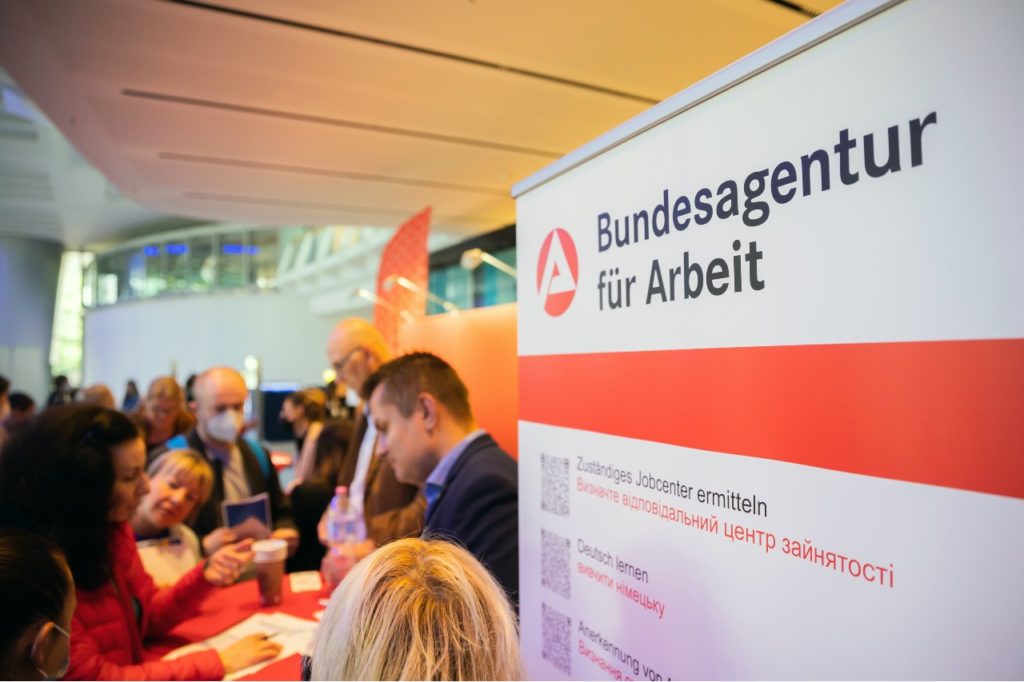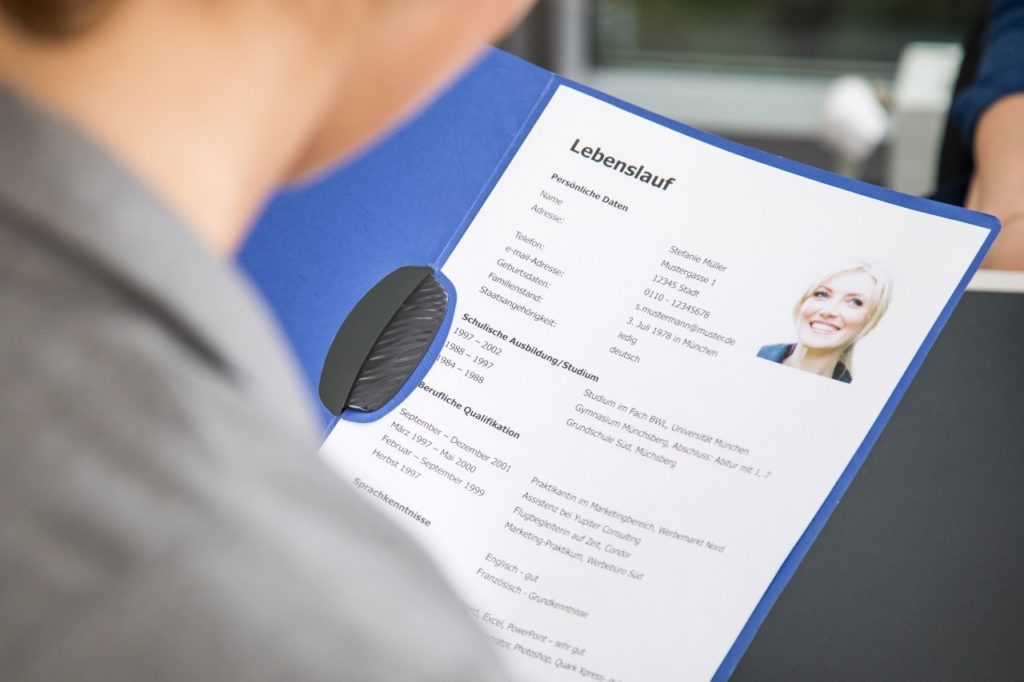The words and phrases you need to navigate the German job market

Embarking on a job search can be a daunting prospect even in your homeland, and even more difficult in Germany. Here are some words, phrases and tips to help you along the way.
The search
Luckily, there are various ways to look for a job in Germany.
The easiest starting point is looking at online portals, where employers advertise their current openings. These go by several names – including Stellenbörse or Jobbörse (job exchange), or Stellenmarkt (job market).
The best one, of course, is The Local’s very own, which gives you a great overview of the best English language jobs going in Germany, but there are also many others such as indeed.de, and the jobs page of the federal employment agency website.
While searching for a job, you’ll need to filter your options according to which type of position you’re looking for.
If you want a full-time position, you should check the box for Vollzeit and Teilzeit for part-time work.
READ ALSO: Working in Germany: Which sectors currently have the most job openings?
If you’re looking for a freelance gig, then you should look for positions advertising for a freier Mitarbeiter, while if you’re seeking a salaried position – where your healthcare and tax contributions are taken care of by the employer – then you should look for jobs as a Festangestellter (permanent employee).
If the job advert you come across specifies Fachkräfte or Facharbeiter, this means that they are seeking a specialist, so if you are looking to learn on the job, these positions are probably not for you.
But if you do want to learn on the job, then you might want to consider positions for a Praktikant (intern) or if you’re doing a formal training course with a view to entering a specific occupation – you could look for positions as an Azubi (Auszubildende/r) - a trainee or an apprentice.
If you find an organisation that you would like to work for, but which doesn’t currently have any advertised vacancies, you can try sending them eine Initiativbewerbung – literally an “initiative application” - as an e-mail or even by post.
A handy opening phrase to keep in mind for such applications is:
Ich bin auf der Suche nach einer Stelle in…
"I am looking for a job in…"
If you’re not getting anywhere online, you can also try looking out our for a Jobmesse (job fair) in your local area.

A job fair for Ukrainian refugees organised by the Berlin Chamber of Industry and Commerce and the Federal Employment Agency in June, 2022. Photo: picture alliance/dpa | Christoph Soeder
Another option is to get a professional to help you with your job search. A recruitment agency – or eine Personalvermittlung, can put you in touch with a job agent - ein Personalvermittler - who can look for jobs and interviews on your behalf and who will usually be paid by commission from your eventual employer.
The application
A standard job application in Germany consists of der Lebenslauf (CV), das Anschreiben or der Bewerbungsbrief (cover letter) and important Unterlagen (documents) featuring the two Z’s: Zeugnisse and Zertifikate (both meaning "certificates").
READ ALSO: EXPLAINED: The 25 most in-demand jobs in Germany
As in most other countries, your German Lebenslauf should include a summary of your beruflicher Werdegang (professional background), Qualifakationen (qualifications), as well as Sprachen (language skills), Kenntnisse (relevant knowledge) and even Hobbys (hobbies).

An employer reviews a CV. Photo: picture alliance/dpa/dpa-tmn | Christin Klose
Under German anti-discrimination law (AGG), you are allowed, but not obliged, to include such things as your religion, gender, date of birth, nationality and photo.
READ ALSO: Six things you should know about creating a cover letter and résumé
The second standard document to send along with your CV is the cover letter. As in the English-speaking world, this should be no more than a page of writing, describing your motivation and suitability for the job and telling the employer why you want to work for their organisation specifically.
It's best to try to find out the name of the person in HR or the head of the department who will be reviewing your application and address it directly to them. While a general Sehr geehrte Damen und Herren is a safe backup, it can sound a little old-fashioned and general.
Most employers will want a reference or two along with your CV and cover letter, so make sure you include an Arbeitszeugnis and other relevant Zeugnisse and Zertifikate, such as Ausbildungszeugnisse (training certificates), Studienzeugnisse (study certificates) and Zertifikate über Fort- und Weiterbildungen (certificates of further education and training).
The Interview
If your written application is enough to impress your potential employer, you will be invited to a Vorstellungsgespräch which literally means “introductory conversation” - but is definitely an interview.
READ ALSO: How easy is it to get an English-speaking job in Germany?
This can be a nerve-wracking experience to have in German, but if you keep a few of these handy phrases in your pocket, you'll sail through.
Ich bin sehr zuverlässig
I am very reliable
Ich möchten mich beruflich weiterentwickeln
I would like to develop professionally
Ich habe schon viele Erfahrung in diesem Bereich gesammelt
I already have a lot of experience in this field
Ich lege viel Wert auf Kreativität in meiner Arbeit
I place great value on creativity in my work
Auch unter Druck kann ich gut arbeiten und ruhig bleiben
Even under pressure I can perform well and stay calm
Comments
See Also
The search
Luckily, there are various ways to look for a job in Germany.
The easiest starting point is looking at online portals, where employers advertise their current openings. These go by several names – including Stellenbörse or Jobbörse (job exchange), or Stellenmarkt (job market).
The best one, of course, is The Local’s very own, which gives you a great overview of the best English language jobs going in Germany, but there are also many others such as indeed.de, and the jobs page of the federal employment agency website.
While searching for a job, you’ll need to filter your options according to which type of position you’re looking for.
If you want a full-time position, you should check the box for Vollzeit and Teilzeit for part-time work.
READ ALSO: Working in Germany: Which sectors currently have the most job openings?
If you’re looking for a freelance gig, then you should look for positions advertising for a freier Mitarbeiter, while if you’re seeking a salaried position – where your healthcare and tax contributions are taken care of by the employer – then you should look for jobs as a Festangestellter (permanent employee).
If the job advert you come across specifies Fachkräfte or Facharbeiter, this means that they are seeking a specialist, so if you are looking to learn on the job, these positions are probably not for you.
But if you do want to learn on the job, then you might want to consider positions for a Praktikant (intern) or if you’re doing a formal training course with a view to entering a specific occupation – you could look for positions as an Azubi (Auszubildende/r) - a trainee or an apprentice.
If you find an organisation that you would like to work for, but which doesn’t currently have any advertised vacancies, you can try sending them eine Initiativbewerbung – literally an “initiative application” - as an e-mail or even by post.
A handy opening phrase to keep in mind for such applications is:
Ich bin auf der Suche nach einer Stelle in…
"I am looking for a job in…"
If you’re not getting anywhere online, you can also try looking out our for a Jobmesse (job fair) in your local area.

Another option is to get a professional to help you with your job search. A recruitment agency – or eine Personalvermittlung, can put you in touch with a job agent - ein Personalvermittler - who can look for jobs and interviews on your behalf and who will usually be paid by commission from your eventual employer.
The application
A standard job application in Germany consists of der Lebenslauf (CV), das Anschreiben or der Bewerbungsbrief (cover letter) and important Unterlagen (documents) featuring the two Z’s: Zeugnisse and Zertifikate (both meaning "certificates").
READ ALSO: EXPLAINED: The 25 most in-demand jobs in Germany
As in most other countries, your German Lebenslauf should include a summary of your beruflicher Werdegang (professional background), Qualifakationen (qualifications), as well as Sprachen (language skills), Kenntnisse (relevant knowledge) and even Hobbys (hobbies).

Under German anti-discrimination law (AGG), you are allowed, but not obliged, to include such things as your religion, gender, date of birth, nationality and photo.
READ ALSO: Six things you should know about creating a cover letter and résumé
The second standard document to send along with your CV is the cover letter. As in the English-speaking world, this should be no more than a page of writing, describing your motivation and suitability for the job and telling the employer why you want to work for their organisation specifically.
It's best to try to find out the name of the person in HR or the head of the department who will be reviewing your application and address it directly to them. While a general Sehr geehrte Damen und Herren is a safe backup, it can sound a little old-fashioned and general.
Most employers will want a reference or two along with your CV and cover letter, so make sure you include an Arbeitszeugnis and other relevant Zeugnisse and Zertifikate, such as Ausbildungszeugnisse (training certificates), Studienzeugnisse (study certificates) and Zertifikate über Fort- und Weiterbildungen (certificates of further education and training).
The Interview
If your written application is enough to impress your potential employer, you will be invited to a Vorstellungsgespräch which literally means “introductory conversation” - but is definitely an interview.
READ ALSO: How easy is it to get an English-speaking job in Germany?
This can be a nerve-wracking experience to have in German, but if you keep a few of these handy phrases in your pocket, you'll sail through.
Ich bin sehr zuverlässig
I am very reliable
Ich möchten mich beruflich weiterentwickeln
I would like to develop professionally
Ich habe schon viele Erfahrung in diesem Bereich gesammelt
I already have a lot of experience in this field
Ich lege viel Wert auf Kreativität in meiner Arbeit
I place great value on creativity in my work
Auch unter Druck kann ich gut arbeiten und ruhig bleiben
Even under pressure I can perform well and stay calm
Join the conversation in our comments section below. Share your own views and experience and if you have a question or suggestion for our journalists then email us at [email protected].
Please keep comments civil, constructive and on topic – and make sure to read our terms of use before getting involved.
Please log in here to leave a comment.